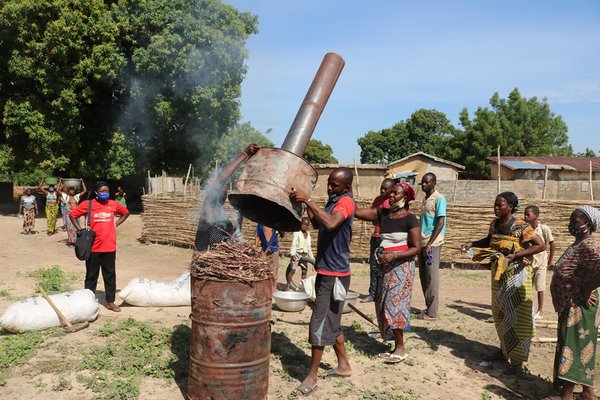 Read this article in French
Read this article in French- Share this article
- Subscribe to our newsletter
How organic fertiliser improves the soil and protects the climate
Whether it be agro-ecological practices, new approaches in developing a circular economy or regional business models – a wide range of challenges such as scarce resources and crises are putting demands on smallholders to respond. Commissioned by Germany’s Federal Ministry for Economic Cooperation and Development (BMZ), the global project Conserving and Rehabilitating Soil to Promote Food Security (ProSoil) of Deutsche Gesellschaft für Internationale Zusammenarbeit (GIZ) supports smallholders in producing organic fertiliser and switching to practices improving the soil which require less input from outside. In healthy soils, plants can make more efficient use of smaller amounts of fertiliser, which lowers costs for the farmers and the government, which frequently purchases and subsidises mineral fertiliser with hard to come by foreign exchange.
Sustainable nutrient and carbon management with biochar
The current fertiliser crisis and the foreseeable scarcity of important nutrients such as phosphate are making it absolutely necessary to close nutrient cycles. In the Indian Federal State of Maharashtra, together with the Indian partners, the global project is supporting a pioneering circular economy model. Urban organic waste is processed into a profitable input, compost, and marketed via a Blockchain-based platform. This is a win-win situation for urban and rural areas from which smallholders and the urban population benefit equally. Developing the value chain creates jobs and income. At the same time, the soil quality in Maharashtra is improved. This is active climate protection. By switching from mineral fertiliser to compost and other measures to enhance organic soil substance, greenhouse gas emissions are avoided, and carbon stocks in the soil are raised.
It is not only in India that ways have been demonstrated to stabilise sustainable nutrient and carbon management, secure harvests in dry phases and achieve better yields in comparison to conventional production systems. Efforts are also being made in West Africa. In Benin and Burkina Faso, the global project is supporting the production and use of biochar in agriculture. The biochar is gained from harvest waste which would otherwise simply be burnt and mixed with dung or compost as Terra Preta (“black earth”), it is brought into the soil. Terra Preta and biochar raise organic soil substance and hence carbon sequestering in soil while simultaneously enhancing its water retention capacity and nutrient availability, and hence also the harvest yields.
But further innovations are needed. In Ethiopia, for example, large amounts of animal bones accumulate as unused offal. The global project is supporting an Ethiopian university in developing a process to produce bone char, which is rich in phosphate and thus improves the soil’s carbon content.
Further information:
Conserving and rehabilitating soil to promote food security and climate protection
Link to WOCAT SLM database the World Overviews of Conversation Approaches and Technologies
Author: Contact: Anneke Trux, ProSoil – Deutsche Gesellschaft für Internationale Zusammenarbeit (GIZ) GmbH, Bonn/Eschborn, Germany, contact: Anneke.trux@giz.de





Add a comment
Be the First to Comment